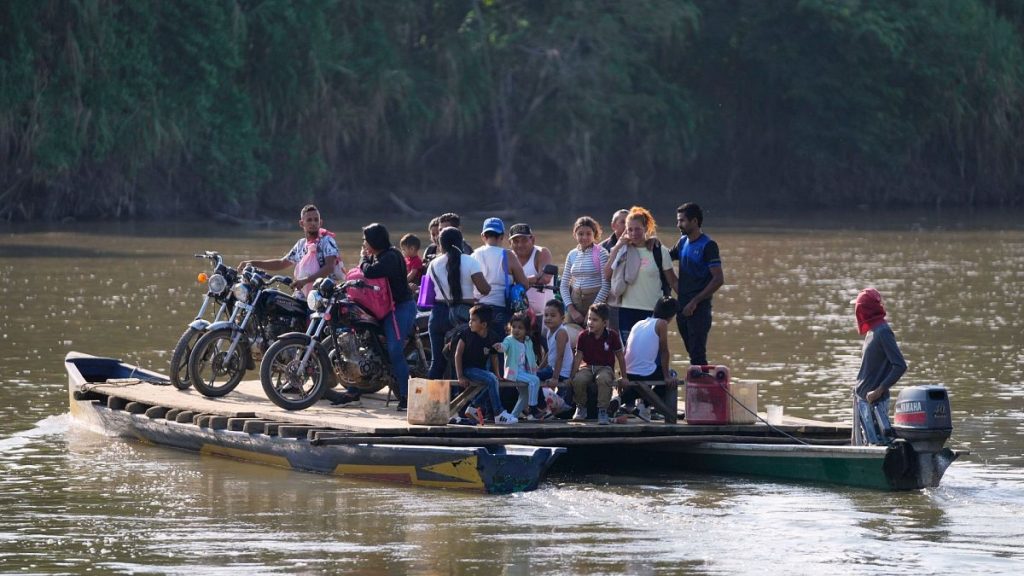The escalating violence between rebel groups in Colombia’s Catatumbo region has triggered a humanitarian crisis, claiming at least 80 lives and displacing over 18,000 people. The resurgence of conflict between the National Liberation Army (ELN) and a dissident faction of the Revolutionary Armed Forces of Colombia (FARC), known as FARC-EMC, has shattered the fragile peace in the region, forcing thousands to flee their homes in search of safety. Approximately 1,000 residents of the border village of Tres Bocas have sought refuge in neighboring Venezuela, leaving their homes deserted and transforming the once-vibrant community into a ghost town. The escalating violence underscores the fragility of the peace process and the ongoing challenges facing Colombia in its efforts to consolidate stability and security.
The root of the renewed conflict lies in the struggle for control of lucrative drug trafficking routes in the Catatumbo region, a key area for coca production, which is used to manufacture cocaine. This resource-rich region accounts for approximately 15% of Colombia’s coca production, making it a strategic territory for armed groups seeking to finance their operations and exert influence. The ELN and the FARC-EMC, both seeking to dominate this illicit trade, have engaged in fierce clashes, trapping civilians in the crossfire and forcing them to abandon their homes and livelihoods. The breakdown of a previous truce between the two groups has exacerbated the situation, leading to a rapid escalation of violence and displacement.
The recent attacks on civilians, including accusations of forced removals and executions, have intensified the humanitarian crisis. The ELN’s accusations against civilians of collaborating with the FARC-EMC have further fueled the violence, creating an atmosphere of fear and mistrust within the affected communities. Reports of civilians being forcibly removed from their homes and shot at close range paint a grim picture of the brutal reality facing those caught in the conflict. The targeting of civilians represents a grave violation of international humanitarian law and underscores the urgent need for intervention to protect vulnerable populations.
The Colombian government, led by President Gustavo Petro, has responded to the escalating crisis by suspending peace talks with the ELN, accusing the group of committing war crimes. This decision reflects the government’s condemnation of the ELN’s attacks on civilians and its commitment to holding those responsible accountable. President Petro’s announcement of an impending emergency decree aimed at expediting legislation to address the conflict further demonstrates the government’s resolve to tackle the crisis and restore stability to the region. The emergency decree is intended to provide the government with the necessary tools to respond effectively to the violence and provide assistance to those affected.
The international community has also expressed deep concern over the escalating violence and the resulting humanitarian crisis. UN Secretary-General Antonio Guterres has condemned the attacks on civilians and called for an immediate cessation of hostilities. His appeal for unhindered humanitarian access underscores the urgent need to provide assistance to displaced populations and ensure their safety. The UN’s call for armed groups to respect the rights of civilians highlights the importance of protecting vulnerable populations and upholding international humanitarian law. The international community’s engagement is crucial in supporting Colombia’s efforts to address the crisis and prevent further escalation.
The ongoing violence in the Catatumbo region underscores the complexity of the peace process in Colombia and the persistent challenges posed by armed groups. The struggle for control of illicit economies, coupled with the breakdown of truces and the targeting of civilians, highlights the fragility of the peace and the need for sustained efforts to address the root causes of the conflict. The humanitarian crisis resulting from the displacement of thousands of people requires a coordinated response from the government, international organizations, and civil society to provide assistance and protection to those affected. The situation demands urgent action to de-escalate the violence, protect civilians, and promote a lasting peace in the region.














